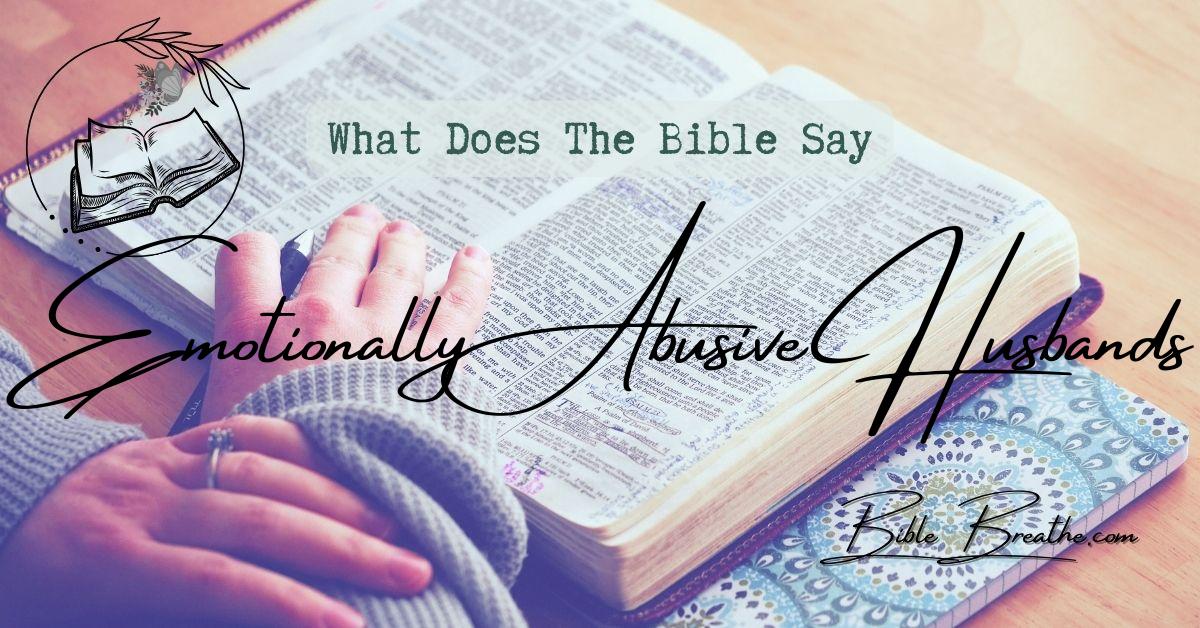What does the Bible say about emotionally abusive husbands?
This is like looking for a lifeboat in a stormy sea.
When we open that sacred book, we step into a world of love, grace, and pain.
Emotional and verbal abuse, it’s like a poisonous snake coiled in the shadows, ready to strike.
Now, some folks, they got this idea that God’s okay with this mess, but that’s a twisted tale.
We need to find a Biblical perspective on abuse.
What’s God’s view on this suffering?
How can we break free from the chains of abusive relationships and heal from the emotional trauma?
The church, it’s got a role too.
It should be a place of support, accountability, and justice for the hurting.
Remember, it’s not just about “what” the Bible says, but “how” we can make a difference in this storm.
Let’s navigate these rough waters with empathy, compassion, and a whole lot of love.
Key Takeaways
- Wondering, what does the Bible say about emotionally abusive husbands? The answer is clear: God condemns all forms of abuse, emphasizing a stance against any harm inflicted.
- Dive into the Scriptures, and you’ll find a profound call to understand and address emotional abuse. It’s not just a relational issue; it’s a spiritual concern too.
- As believers, our responsibility goes beyond condemnation. The Bible emphasizes the role of the church and individual believers in actively supporting victims, embodying God’s love and compassion.
- In confronting the issue of emotional abuse, we are not only promoting healing but also living out the core teachings of our faith.
Navigating the Storm of Emotional Turmoil in Relationships
Photo modified by BibleBreathe.com. Original photo by Anete Lusina on Pexels
In this intricate maze of human connections, the Bible holds a lamp to guide us, to shed light on the shadowy corners where emotional abuse sometimes lurks.
Let’s embark on a journey through the scriptures to unearth truth and dispel any misconceptions.
The Twisted Interpretations of God’s Heart
The Bible is a deep well of wisdom, but sometimes people misinterpret its words, steering into perilous waters.
Sadly, there are individuals who misuse certain verses, distorting their meaning to justify emotional cruelty within their marriages.
They wrongly claim divine authority to exert control and instill fear.
However, we must pause and ask ourselves: Is this what the scriptures truly intend?
“Husbands, love your wives, even as Christ also loved the church, and gave himself for it.” – Ephesians 5:25 (KJV)
This verse, often plucked out of its context, should be viewed in its entirety.
Love, as portrayed in the Bible, is a gentle, sacrificial devotion—a far cry from manipulation or emotional tyranny.
The Peril of Misreading Scriptures to Validate Harm
Misinterpretation can unleash calamity.
It can fuel an unending cycle of pain, allowing emotional abuse to fester within families.
The wounds caused by hurtful words and demeaning actions stand at odds with the teachings of love, compassion, and empathy that the Bible emphasizes.
We must keep in mind that the Bible fundamentally advocates for respect, understanding, and kindness in relationships.
It calls for mutual love and support, not oppression or suffering.
“And be ye kind one to another, tenderhearted, forgiving one another, even as God for Christ’s sake hath forgiven you.” – Ephesians 4:32 (KJV)
Understanding these biblical principles enables us to grasp the true nature of a loving relationship.
Let us strive to interpret the scriptures through the lens of compassion and righteousness, always seeking healing and redemption for the wounded hearts enduring emotional agony.
God’s Firm Stand Against Emotional Cruelty in Marriage
Photo modified by BibleBreathe.com. Original photo by Anete Lusina on Pexels
Ever felt the weight of a heart heavy with hurt and words that wound?
God’s heart aches when He sees the pain inflicted by emotional abuse, especially within the sacred vows of marriage.
God’s Distaste for Cruelty
“These six things the Lord hates, yes, seven are an abomination to Him: A proud look, a lying tongue, and hands that shed innocent blood, a heart that devises wicked plans, feet that are swift in running to evil, a false witness who speaks lies, and one who sows discord among brethren.” – Proverbs 6:16-19 (KJV)
God’s loathing for abuse is clear and strong.
Emotional and physical harm within the marriage covenant goes against the love and kindness He encourages.
The Hollow Faith of an Abuser
“If a person among you appears to be religious but can’t control their tongue, they deceive themselves, and their religion is worthless.” – James 1:26 (KJV)
Mere words of faith mean nothing when coupled with actions that bring pain.
Genuine faith is wrapped in compassion and love, not in causing suffering.
Abusers: Detestable to the Lord
“He who justifies the wicked, and he who condemns the just, both of them alike are an abomination to the Lord.” – Proverbs 17:15 (KJV)
Those who engage in abuse or support it are partaking in actions detested by the Lord.
It’s a stark deviation from the paths of righteousness and love.
The Power of Hurtful Words
“Death and life are in the power of the tongue, and those who love it will eat its fruit.” – Proverbs 18:21 (KJV)
Words, when used as weapons, hold the power to bring about destruction and sorrow.
God warns against the misuse of this potent instrument.
The Heavy Load of Emotional Cruelty
“A stone is heavy and sand is weighty, but the provocation of a fool is heavier than both.” – Proverbs 27:3 (KJV)
The burden of emotional abuse is like carrying stones that crush the spirit, leaving lasting scars.
The Consequences for Abusive Figures
But whoever causes one of these little ones who believe in Me to stumble, it would be better for him if a millstone were hung around his neck, and he were drowned in the depth of the sea.” – Matthew 18:6 (KJV)
God’s warning against causing harm, especially to the vulnerable, is grave.
Abusing one’s family, especially the children, results in dire consequences in the eyes of the Lord.
The Severity of Emotional Cruelty in God’s View
“There is one who speaks like the piercings of a sword, but the tongue of the wise promotes health.” – Proverbs 12:18 (KJV)
God understands the pain inflicted by hurtful words.
He values words that bring healing and life, not those that pierce the soul.
In God’s blueprint for relationships, love, compassion, and empathy are the threads that weave the fabric of how we should treat one another.
Abuse, in any form, stains this divine design.
Jesus’ Heartache: A Glimpse into Emotional Struggles
Photo modified by BibleBreathe.com. Original photo by Odonata Wellnesscenter on Pexels
In the grand tapestry of the Bible, Jesus Christ, a central figure, faced deep emotional abuse during His time on Earth.
His experiences shed a piercing light on the nature of emotional torment, underlining the urgency of recognizing and addressing this issue in our society today.
The Crushing Accusations and Mockery He Endured
Picture this: Jesus, bearing the weight of humanity’s sins, also endured a torrent of accusations and mockery from those threatened by His revolutionary teachings and influence.
The religious leaders of His time spewed insults, questioning His authority and purpose.
“Likewise also the chief priests mocking him, with the scribes and elders, said, ‘He saved others; himself he cannot save.'” – Matthew 27:41-42 (KJV)
This verbal assault on Jesus unveils the hurtful power of words, showcasing how they can be wielded to belittle and demean even the most innocent.
The Crafty Blame-Shifting and Denial Tactics
In the face of their own guilt, the Pharisees—the religious leaders—often engaged in a sly blame game and denial, attempting to trap Jesus in His words to discredit Him.
This behavior mirrors the tactics employed by emotionally abusive individuals who dodge responsibility for their actions.
“And when he was come into the temple, the chief priests and the elders of the people came unto him as he was teaching, and said, ‘By what authority doest thou these things? and who gave thee this authority?'” – Matthew 21:23 (KJV)
This unsettling conduct highlights the destructive nature of denial and manipulation within abusive relationships.
The Clarion Call: Recognize and Address the Pain
Jesus’ endurance of emotional abuse delivers a loud message: we must address abuse in all its insidious forms.
It beckons us to discern the signs, extend unwavering support to the victims, and hold the perpetrators accountable.
Learn to do well; seek judgment, relieve the oppressed, judge the fatherless, plead for the widow.” – Isaiah 1:17 (KJV)
The Bible rings out a vital message—seek justice, advocate for the oppressed—especially crucial in the context of emotional abuse.
As we reflect on the agony Jesus bore and the wisdom He imparted, we’re reminded of the pressing need to nurture empathy, compassion, and righteousness in our interactions.
Let’s stand against emotional abuse, extending healing and redemption to those ensnared in its painful grip.
The Church’s Duty in the Face of Emotional Abuse
Photo modified by BibleBreathe.com. Original photo by Odonata Wellnesscenter on Pexels
In the sacred halls of the Church, a weighty responsibility rests on its shoulders — a duty to rise against the shadows of abuse, whether it’s a storm of emotions or physical pain.
The Danger of Letting Abuse Flourish
Letting abuse fester within the Church is akin to letting a weed grow amidst the harvest, thinking it harmless.
In truth, abuse corrodes and spreads its poison, choking the spirit of love and understanding.
“Have nothing to do with the fruitless deeds of darkness, but rather expose them.” – Ephesians 5:11 (KJV)
The Bible urges us not to be complicit in dark actions but to bring them into the light.
Tolerating abuse betrays this divine directive.
The Vital Need for Justice and Accountability
Justice and accountability are pillars that hold up a righteous society.
When it comes to abuse, the Church mustn’t turn a blind eye.
To stand for justice is to stand with God’s plan of righteousness.
“Learn to do right; seek justice. Defend the oppressed. Take up the cause of the fatherless; plead the case of the widow.” – Isaiah 1:17 (KJV)
God’s call for us to seek justice and support the oppressed extends to addressing abuse.
In doing so, we echo His concern for the suffering and His desire for justice.
Extending a Compassionate Hand to the Wounded
In the face of abuse, the Church should shine as a beacon of hope and healing for the victims.
Offering a sanctuary, counseling, and unwavering support to those affected is an embodiment of Christ’s love.
“Carry each other’s burdens, and in this way, you will fulfill the law of Christ.” – Galatians 6:2 (KJV)
This verse underscores the significance of standing with and aiding one another in times of distress.
It’s a principle the Church should embody, especially in the context of abuse.
Embracing Healing and Redemption
Abuse inflicts deep emotional wounds that cry out for healing and redemption.
The Church should actively promote healing, providing solace and a pathway to redemption through faith and community.
“The Lord is close to the brokenhearted and saves those who are crushed in spirit.” – Psalm 34:18 (KJV)
By actively engaging in the healing process, the Church aligns with God’s promise to be near to those with broken hearts and to bring salvation to the contrite.
The role of the Church in addressing abuse is crucial; it’s a call to mirror God’s love, justice, and compassion within its community and beyond.
Only through this collective effort can we cast out the darkness of abuse and foster an environment of love and healing.
Frequently Asked Questions (FAQs) About What Does The Bible Say About Emotionally Abusive Husbands
What does the Bible say about emotional abuse?
The Bible promotes love, kindness, and treating others with respect.
Emotional abuse is contrary to these principles and should be avoided.
How does God view abusers?
God condemns abuse and calls for love, compassion, and justice.
Abusers’ actions go against these principles and can face consequences in both earthly and spiritual realms.
Why is emotional abuse often minimized in religious settings?
Sadly, emotional abuse can be downplayed in religious environments due to misinterpretation of forgiveness or the hierarchy within religious structures.
Misplaced emphasis on forgiveness without addressing the abuser’s behavior might contribute to minimizing emotional abuse.





